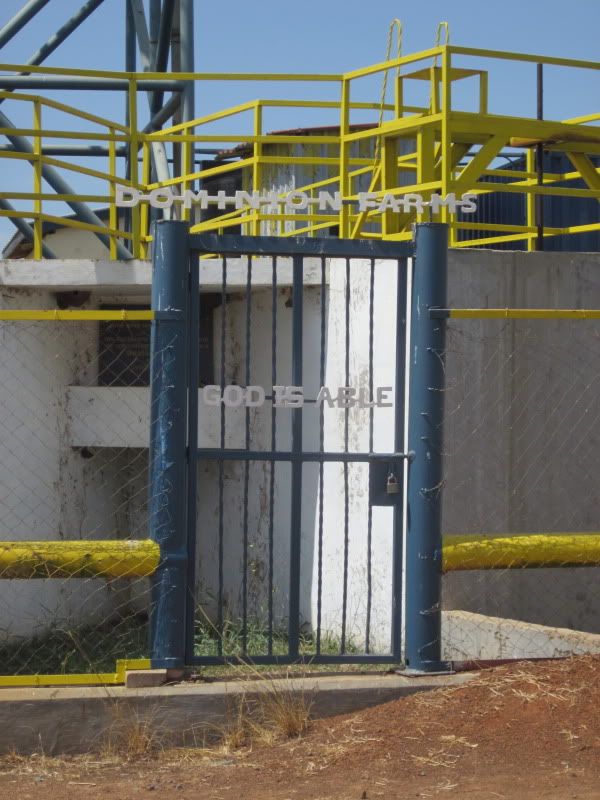
Before visiting Dominion, I spoke to a man who had worked there a few years before. He told me that they would catch these tiny birds in nets and then he would take them home to eat them. He was pretty pleased about it, saying that the birds tasted very sweet. So I asked our guide how they dealt with bird pests.
Guide: Basically what happens is the biggest pest is a Quelea quelea bird, it's really tiny. So they come in millions. They move from the nesting areas to the roosting areas. And they come in the morning for breakfast and for supper in the evening. And each bird eats like 10 grams. And they move in thousands. So imagine if everybody wants to take 10 grams of your rice. It can be a real pest, eh? So we control them. We have permission from the Environmental Authority to control them.
Me: How do you do that? I can imagine it would be difficult.
Guide: It's terrible. The roosting areas where they go in the evenings, they kill them.
Me: With what?
Guide: Just chemicals. Specifically. It kills only the Quelea quelea birds, nothing else.
Amy Lint: How do you get them?
The next bit was difficult to hear on my recording because Amy's baby was talking pretty loudly over the guide, but she said that some guys are in charge of finding where the birds roost and then they spray them with the chemicals. It's a good bet the chemical is Fenthion, an organophosphate that Pesticide Action Network classifies as a Bad Actor, a potential ground water contaminant, and a suspected endocrine disruptor, with moderate acute toxicity. It's not allowed in the United States.
Back to the talk about pests...
Guide: You know, aphids? Then there is the stem borer. Those are the main ones. So we just control them.
Me: Is there a chemical that works best on the stem borer? Or a method that works best?
Guide: We just use the aerial spray.
Me: Now are there ever workers working when the plane comes, or are they told to move away?
Guide: Oh, they can never spray where the workers are.
Me: They cannot spray where the workers are?
Guide: No, no. There are different sections. They cannot come and spray where the people are because that's poisonous to them. So, for the birds, we also have ladies with the jerrycans and stones inside and they shake them really loud and the birds go away. But you see right now, we have the women in this area gapping, they won't be in this area, the aerial spray.
We were interrupted as I saw a really cool bird and tried to get a photo but missed. We were driving along with kind of wild, canal-like areas along the side of the road, and there was lots of wildlife in those areas.
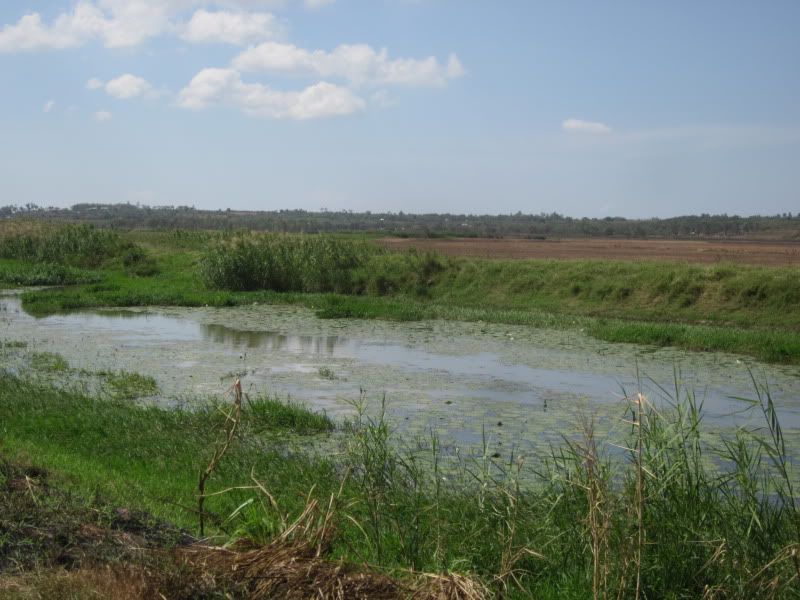
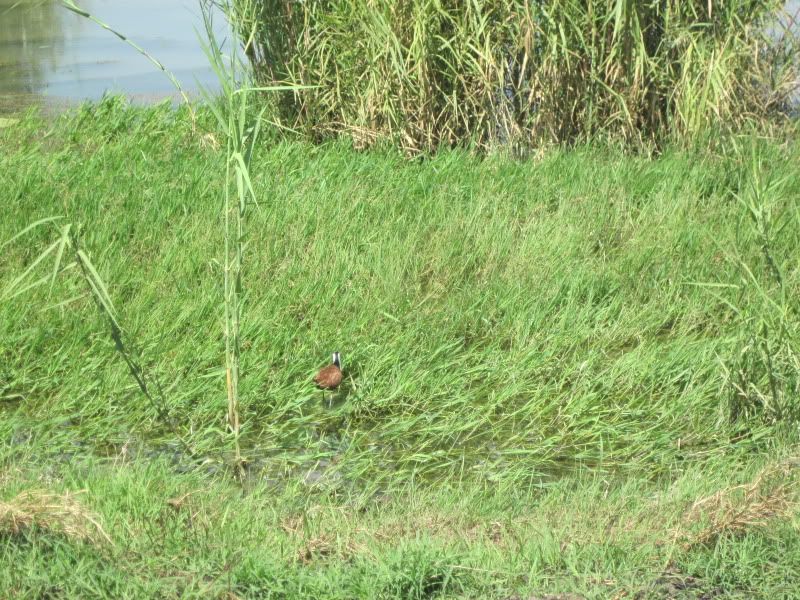
Bird of some sort
Guide: Basically, what you see, the birds that we have, except now there are pelicans as well. And they eat our fish.
Me: The tilapia, that you don't want them to eat?
Guide: Well, if you look in here, you see lots of fish, frogs, they eat that stuff. But at our fish ponds... [inaudible]
Me: Do you know how much the rice yields per acre?
Guide: Anything between 1.3 tonnes and 2.27 tonnes.
Me: Metric tonnes? Like 1000 kg?
Guide: Yes. Depending on the conditions, the season, the weather..
Me: Birds?
Guide: Birds. It depends on so much. Or even the soil, maybe we've used so many chemicals and it's become very acidic. We need to control that. We do that by liming.
AL: So somebody's out there doing all that, right? Like they are taking those measurements and such?
Guide: Actually, yes. Actually, that's what I do. I am in Quality Control. So we try and make sure that -
Me: Do you know what's burning and why? Is that - ? What's the use of burning?
Guide: We usually clear land of weeds by burning. It's fast and efficient.
Me: Is that a common practice in rice cultivation? To burn?
Guide: I don't know if it's common elsewhere, but here we do. Because it's a very big - it's massive land - there's no other way you can actually [inaudible].
So these are the canals on either side.
Me: And it brings water from the swamp?
Guide: I'll show you where it brings water from but I don't think you can go. It's a bit scary.
Me: What, are there crocodiles?
Guide: [laughing] OK, it just scares me. No, no crocodiles. It's just the height and the water is massive and everything.
So you see what happens in the land, it's like a staircase, yeah? One field is above the other and the other like that. The inlet is higher than the outlet, yeah? So when we grow rice in a certain area, we make sure that the fields are in a certain order. So that it goes [inaudible - but she explained basically that the water goes from one canal, downhill by gravity from field to field, and back to the canal]
Me: So it's a closed circuit?
Guide: A closed circuit, yeah.
AL: Everybody that's working here is a Kenyan?
The guide explained that some Americans came initially to do some training and then they went back home. The rest are Kenyan. But later we established that there was one white guy working here still - the pilot of the crop duster. The guide thought he might be from near Naivasha or something.
Then Malaki saw a monitor lizard - a really big one. I couldn't see it. Before long, we saw another one. They have poisonous bites and poisonous tails. And they are HUGE - four feet long and bright green.
Guide: That's our training center over there. We are having some Nigerians over. We are training them just like we were trained.
AL: For how long have the Nigerians been around?
Guide: I think, like six months. But it's intensive, it's intensive.
AL: [surprised] For that long? So are they starting a Dominion in Nigeria?
Guide: I think so.
AL: You don't know??!!
Guide: Ok, yes, they are.
AL: They are opening a Dominion in Nigeria now, and these guys are going to start it up.
Me: The same corporation from Oklahoma?
Guide: Yeah.
AL: Owned by the same guy?
Guide: Yeah.
AL: So what did you get your degree in? Rice?
Guide: No, food science and technology. So it's like, the whole thing from beginning to the package. Or let's say to the plate, cuz we also do sensory tests.
Me: So the rice that they grow here, can we buy it here in Bondo?
Guide: Yeah.
AL: And at the farm, right?
Guide: Yes, the farm prices are cheaper.
Malaki Obado: And vegetables?
Guide: Yeah. We have bananas. Plantain. Vegetables, no. We used to have horticulture before.
MO: I heard there was a section where locals grow. I want to see that.
Guide: Yeah! Oh yeah! I'll ask around, cuz it's at the very edges of - yeah. But they sell some vegetables there.
AL: How much is the rice?
Guide: Rice, depending on the grade, it's like 85 shillings per kg. (about US$1)
AL: And if I want to buy, like, 50 lbs?
Guide: 50 lbs is kilograms?
AL: What about 50 kgs?
Guide: We sell them in 25kg bags, but the grade that we sell in the bags is different from the ones we sell at the market.
MO: The market is a better grade?
Guide: Yeah.
Me: So if I went to, like, Tuskys or Nakumatt [two grocery chains], they would have it?
Guide: Yes.
Me: Which grade is that?
Guide: The packets, we have premium and grade one.
Me: In Tuskys?
Guide: Maybe, yes. What's Nakumatt?
AL: Do you export any?
Guide: Yes. Uganda.
AL: Only to Uganda?
Guide: Actually, we had expanded markets very much. Then the demand was a bit high. And we are still reclaiming land and so until we are able to reach a sustainable amount of production, we have closed most of our markets. Like, we used to sell in Nairobi. We are working on that. We are reclaiming more and more land.
Me: Will I ever be able to buy your rice in the United States?
Guide: Oh that would be something!
Then we started talking about the bananas a bit. They have both plantains and sweet bananas.
Guide: We use the tissue culture techonology [for the bananas]. So in terms of technology, mainly the mechanization. Everything is so heavily mechanized. The labor is done by machines.
Me: But I'd imagine, the breeding, to come up with this variety of rice, to mature in 120 days, produce a high yield
Guide: - and direct seeding -
Me: And direct seeding, that must have been something.
Guide: And it's resistant to most diseases and insects. It's very good. The breeding really took a long while.
Me: I'd be very curious to know how that was done. Like, is it a shorter rice plant than most varieties of rice?
Guide: Yeah. There is one that's short and there's one that's the regular size.
At that point, we came up to the weir. I asked about the papyrus and malaria.
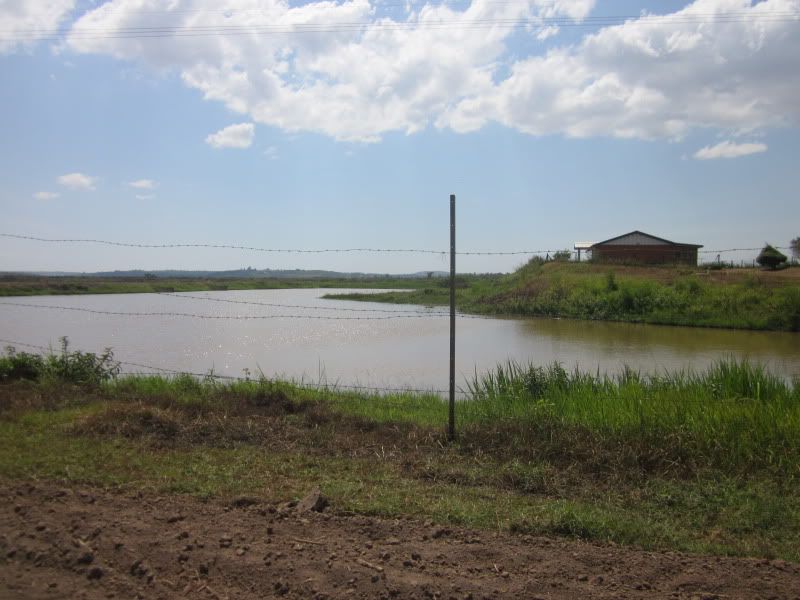
One side of the canal
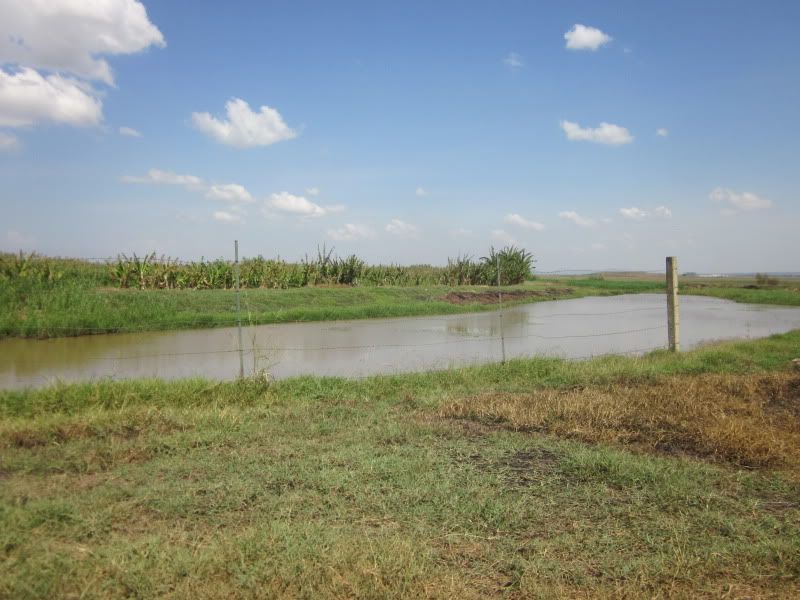
The other side of the canal
Me: But I don't see papyrus.
Guide: There is no papyrus, not here. See, these are the two main canals. One is the outer canal. We have to make sure we kill weeds so that the water can flow. You know, sometimes the plant can [obstruct the water]... We do control papyrus.
Me: But haven't you had malaria problems?
Guide: Oh yes.
Me: How do you deal with that?
Guide: We don't do anything major, just mosquito nets. Treated mosquito nets.
Me: For the workers?
Guide: And also for the people around this area.
Me: You provide them?
Guide: No, the health center provides them.
Me: Is that part of the Kenyan government?
Guide: Yes. They are doing a good job. So this is the weir.
A weir is like a dam that can be opened and shut. You could see the Yala River flowing through the weir. Dominion re-routed the upstream part of the river to flow through this weir. Ultimately, they plan to do hydroelectric power, which will screw with the river downstream.
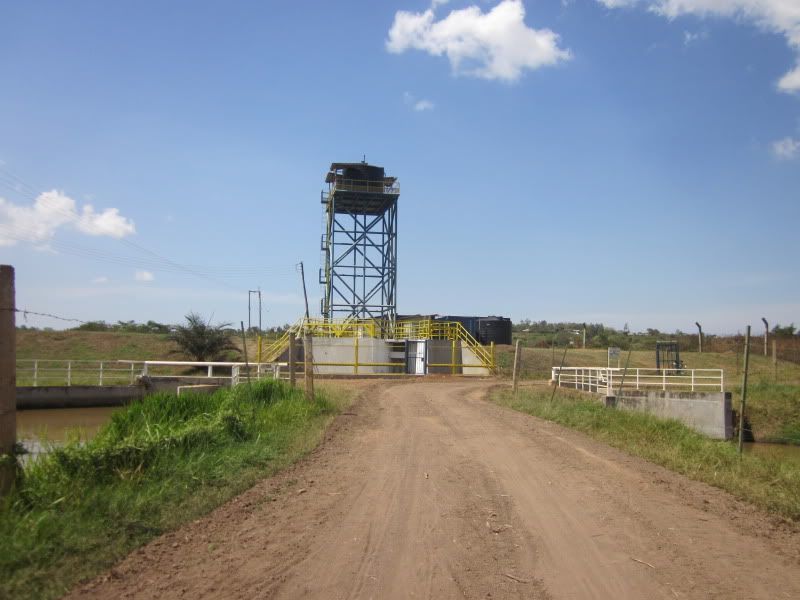
The weir
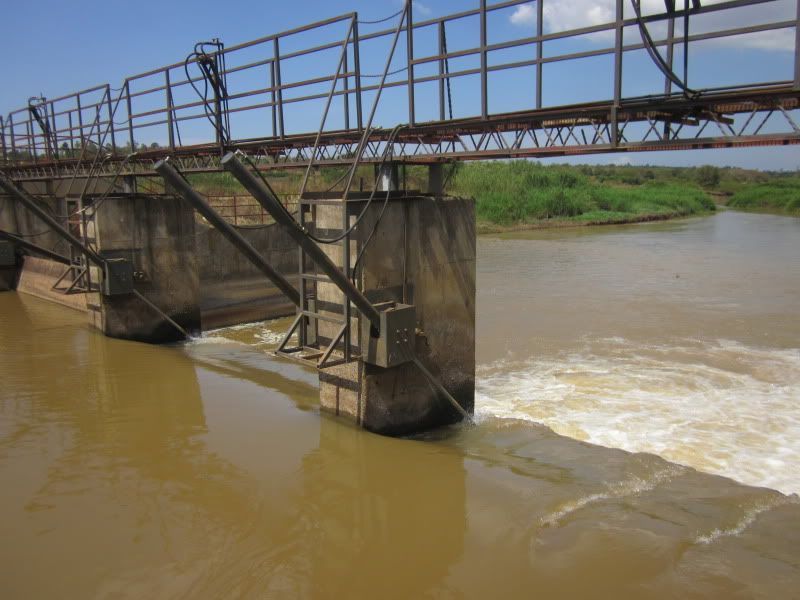
The weir
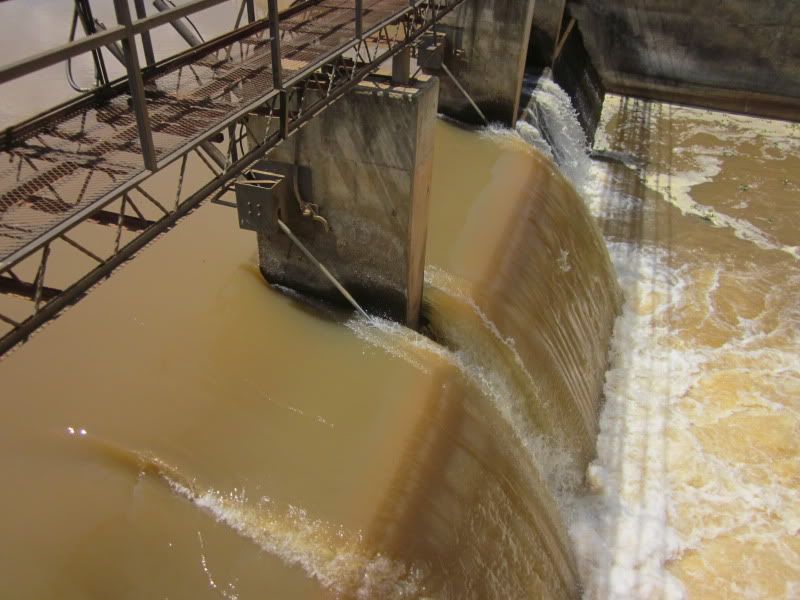
The weir
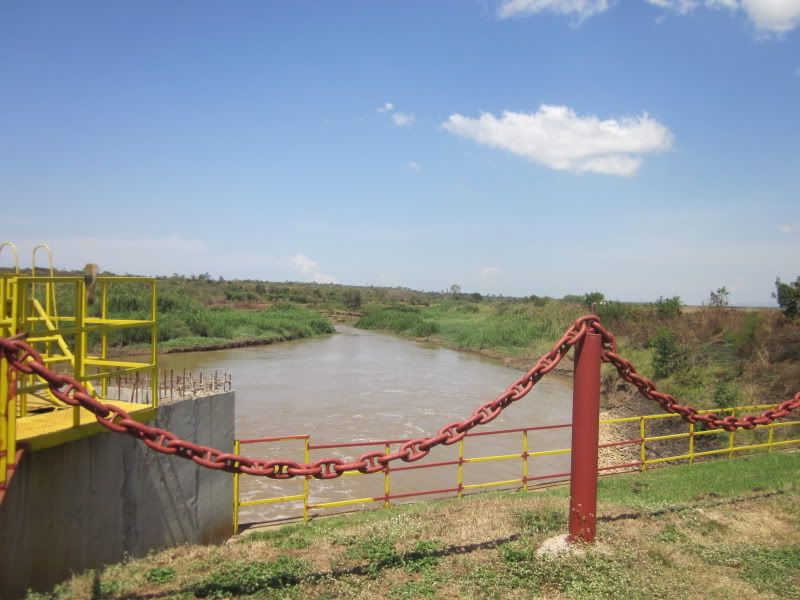
The river downstream from the weir
Me: Did any people live on this land before Dominion came and took it?
Guide: It was a swamp.
Me: It was a swamp, completely uninhabited?
Guide: Yeah. Then after Dominion cleared, Dominion gave some land to the locals.
AL: I think that's not true. Are you sure about that? I think that some people were paid money and sold their land. You're very sure?
Guide: Yeah. It was all under water. And then what happened, Dominion came in and cleared in. So after directing the water [inaudible]
The guide's only had her job for six months. Dominion's been here since 2003. And the guide isn't originally from this area. So she only knows what Dominion has told her.
We stood at the weir and the guide got one of the workers there to demonstrate how they do maintenance on it - which involves some dangerous work walking around below a bridge over the river. The birds around the weir were pretty incredible. I saw some hamerkops and other kinds of birds I didn't recognize.
Guide: This is our weir. So depending on whether we need water at the time or not, we open or close it. So we chose the River Yala because number one, it's very deep. And it goes like this - from high area down to [inaudible]
AL: So how about the Nigerians? Which river?
Guide: [laughing] Actually, I don't know.
AL: Maybe we can ask the Nigerians.
Me: Will you also grow rice in Nigeria?
Guide: Yeah.
Me: How many security people are employed here?
The security people are contractors, not Dominion employees, which means the number of people employed by Dominion total includes Dominion employees (estimated by the guide as 400 people) plus the number of security guards.
Security guy: We are over 100.
MO: So is this the main river coming in?
SG: But the main one was that one. After constructing this one, it was diverted. This one - this is [inaudible] and the former one was [inaudible].
MO: So this wasn't the river before?
Guide: The whole river was diverted?
SG: Yeah.
Jesus christ.
Through a confusing discussion, it was explained that the river is diverted through the weir and then back to its original route, and Dominion only takes the water it needs from the river - not the entire river. Eventually, Dominion wants to use the weir to generate their own hydroelectric power.
While we stood over the weir and I looked at interesting birds, the guide explained that she's severely short sighted. She asked about my glasses and said she had some but lost hers. She's trying to do her job without them and gets migraines as a result. It's very expensive to buy more glasses. I said, "It's a shame your employer can't help you." She replied, "Most employers here don't." She said you're on your own for eyes and teeth.
Here are some interesting birds we saw at Dominion, although I don't know what any of them are:
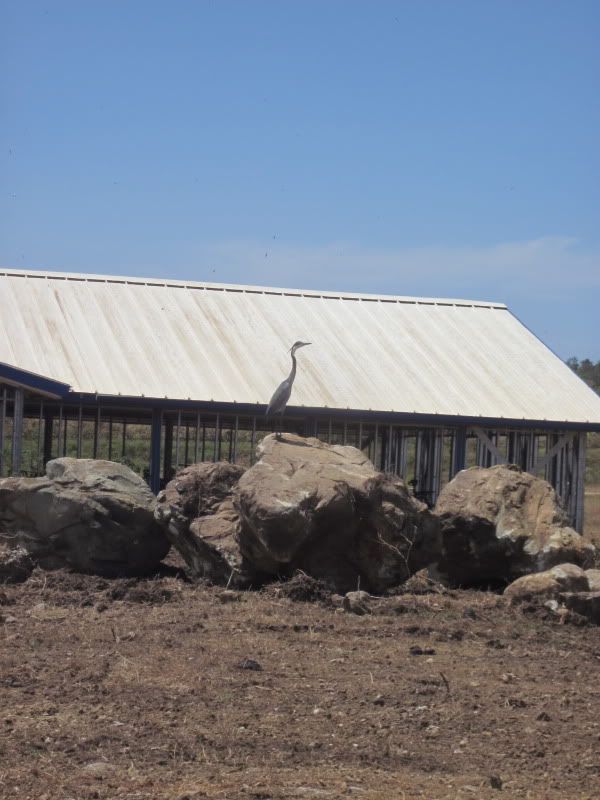
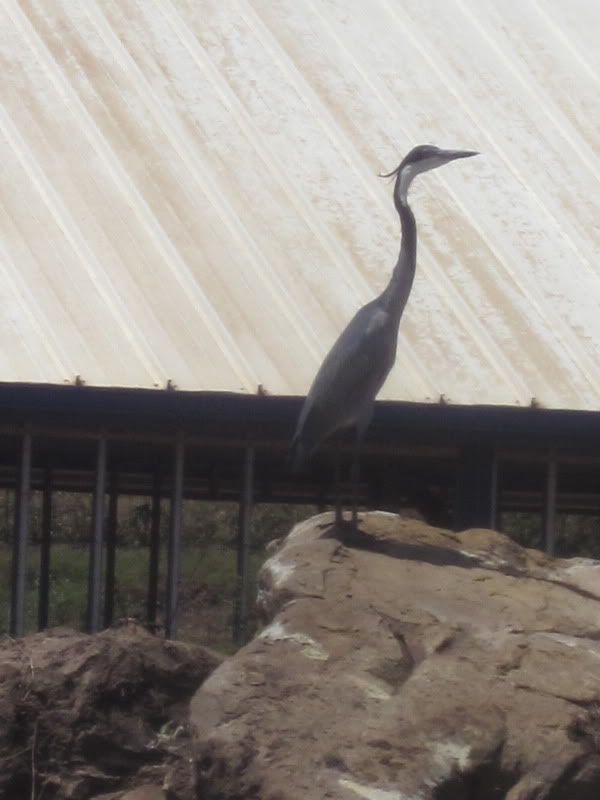
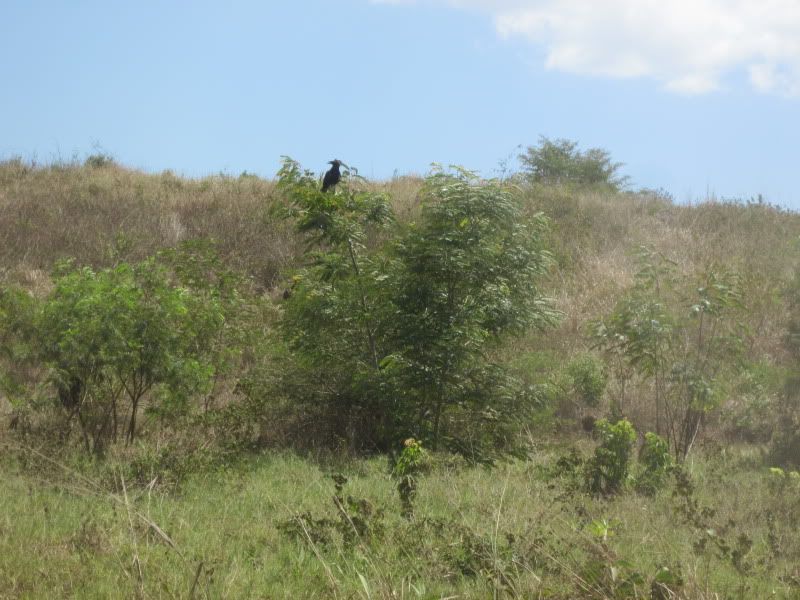
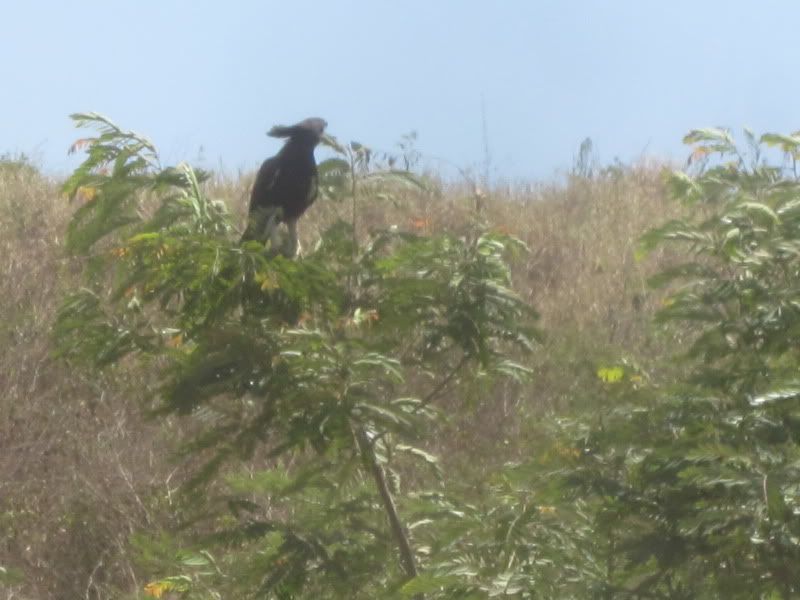
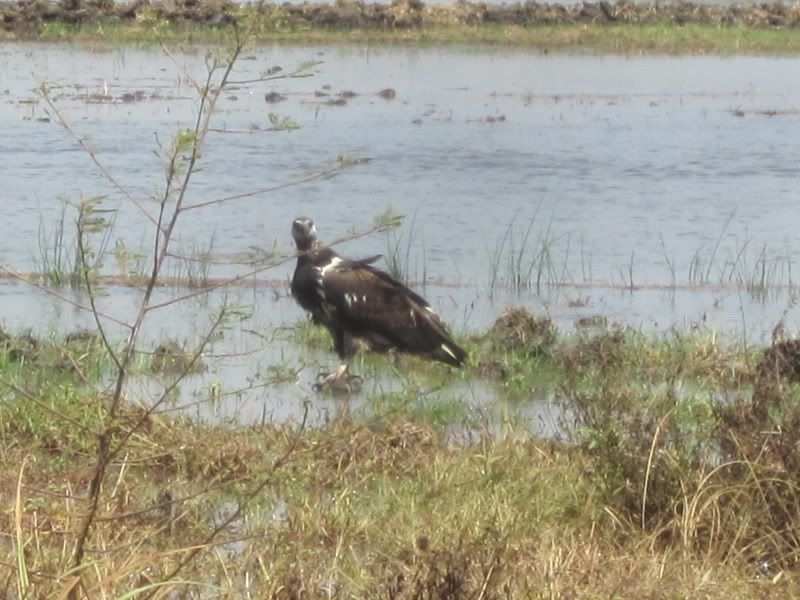
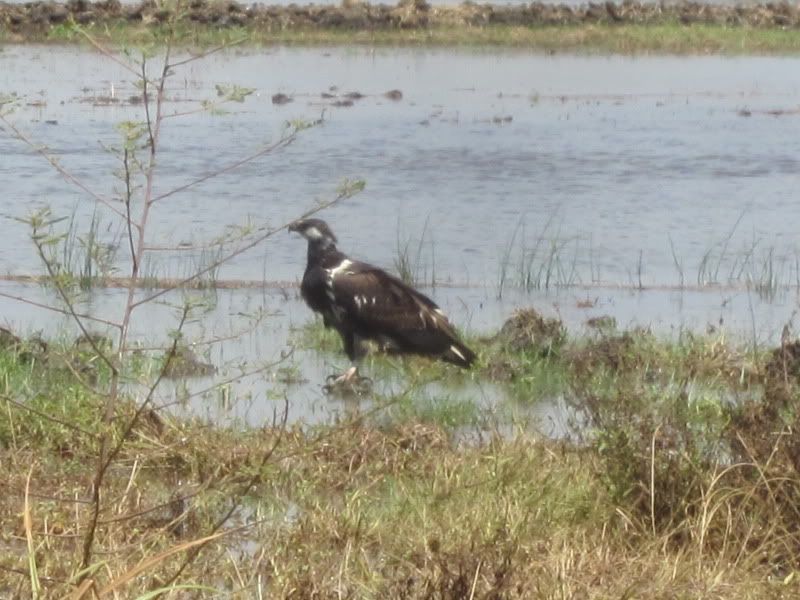
In the next post on Dominion: Tilapia and the rice mill
No comments:
Post a Comment